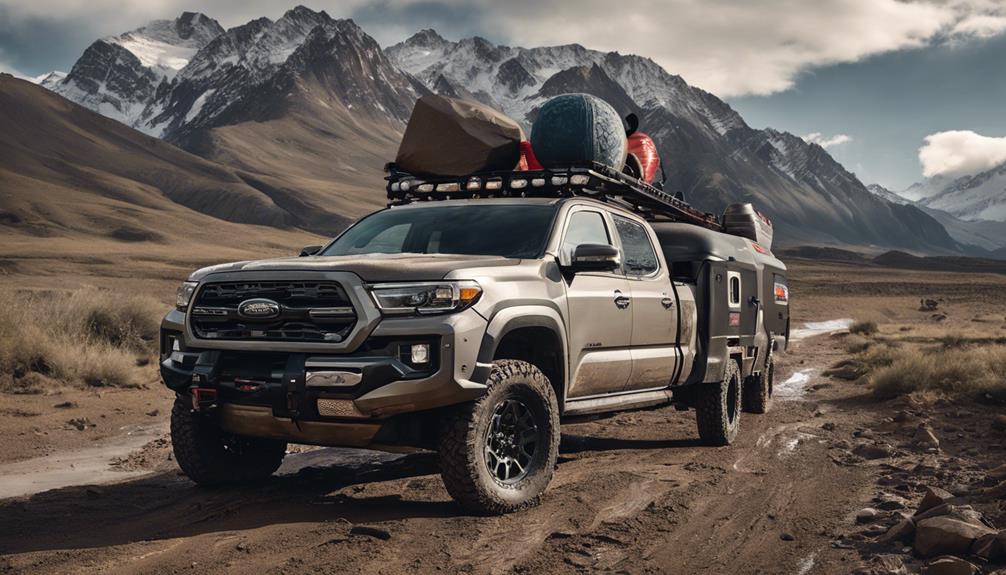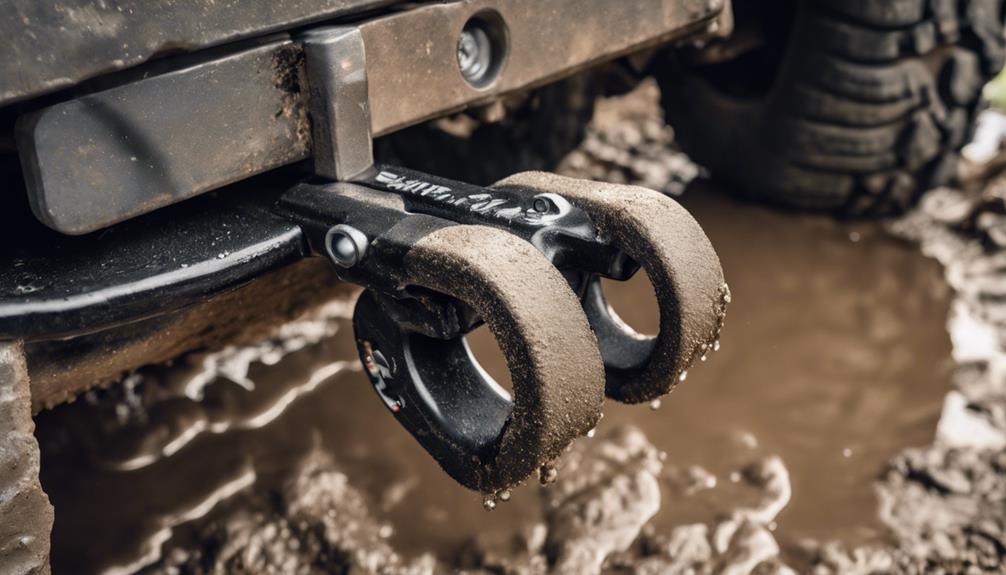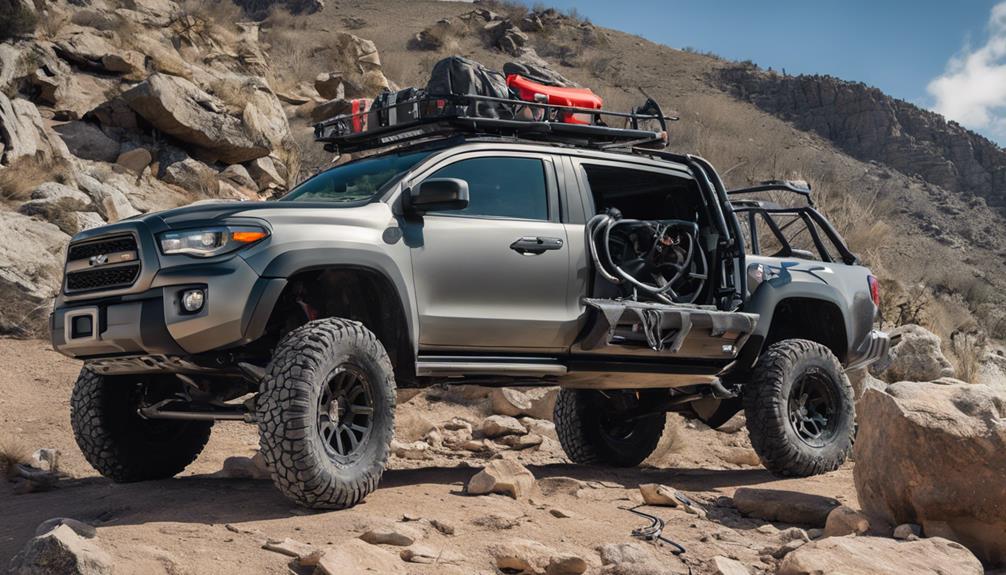When you're preparing for an off-road journey, it's crucial to think about the appropriate tow hitch accessories that can improve your vehicle's performance and safety. You might be wondering which hitch types are most suitable for your needs or how to select the right mounts for peak towing. It's not just about connecting a trailer; the correct accessories can have a substantial impact on your overall experience. As you contemplate your choices, you'll want to investigate the different essential accessories and their upkeep. What you find next could alter how you tackle your upcoming off-road adventure.
Key Takeaways
- Choose a reliable receiver hitch to enhance versatility and compatibility with various off-road accessories.
- Use high-quality tow straps and shackle mounts for secure attachment during challenging towing situations.
- Opt for spare tire carriers to ensure you're prepared for emergencies while off-roading.
- Regularly inspect and maintain your towing equipment to prevent wear and ensure safe performance.
Importance of Off-Road Accessories
Off-road accessories are essential for enhancing your vehicle's towing capabilities and ensuring safety on rugged terrain. When you're traversing challenging landscapes, the right off-road hitch accessories can make all the difference. A reliable trailer hitch is key to securely connecting your load, allowing you to haul heavy gear without worry. Pairing it with a robust Hitch Pin helps maintain that connection during your adventure, ensuring everything stays in place, no matter the bumps you encounter.
Investing in high-quality accessories not only boosts performance but also enhances your vehicle's versatility. Features like shackle mounts and winch mounting plates provide additional functionality, making your off-road experience safer and more enjoyable. You want peace of mind when tackling the wild, and knowing your equipment is up to the task is essential.
Moreover, outstanding Customer Service can guide you in selecting the right accessories tailored to your specific needs. Whether you're a seasoned off-roader or just starting, having reliable support can strengthen your connection to the community, making each adventure a shared experience. Don't underestimate the importance of these accessories; they're crucial for a successful off-road journey.
Essential Hitch Types
When it comes to enhancing your vehicle's towing capabilities, understanding the different types of hitches is important for tackling off-road adventures effectively. In the United States, various hitch types cater to specific needs, ensuring you're well-equipped for any terrain.
Here are three essential hitch types you should consider:
- Receiver Hitches: These are the most common and versatile hitches, allowing you to attach various accessories like tow straps and winches. They come in multiple sizes, ensuring compatibility with different off-road gear.
- Pintle Hitches: Ideal for heavy-duty towing, pintle hitches provide a more secure connection than traditional ball hitches. They're particularly useful for off-road conditions, where stability is pivotal.
- Gooseneck Hitches: Designed for larger trailers, gooseneck hitches offer enhanced towing capacity and stability. They're a great option if you need to haul significant loads on rough terrains.
Key Accessories for Towing

Equipping your vehicle with the right towing accessories can greatly enhance your off-road experience, guaranteeing you're prepared for any challenge that comes your way. One essential accessory is a tow strap, which provides the necessary strength to pull or be pulled out of tough situations. Whether you're stuck in mud or helping a fellow off-roader, a high-quality tow strap is a must-have.
Another key component is a shackle mount. This accessory allows you to securely attach your tow strap to your vehicle or another anchor point, ensuring safe and effective towing without compromising stability. Look for shackle mounts designed to fit various receiver sizes, so you can have compatibility with your vehicle.
Don't forget about a spare tire carrier, especially when adventuring off the beaten path. Flat tires can happen at the most inconvenient times, and having a spare tire readily accessible guarantees you won't be left stranded. With these key accessories—tow strap, shackle mount, and spare tire carrier—you'll reinforce your off-road capabilities and truly embrace the thrill of adventure while feeling secure in your setup.
Choosing the Right Mount
When selecting the right mount for your off-road towing needs, you need to take into account compatibility with your vehicle's hitch size and weight capacity. Analyzing the weight capacity of your chosen mount is essential to guarantee safe towing on rugged terrain. Additionally, ease of installation can make a significant difference in your overall experience, allowing you to get back on the trail faster.
Mount Compatibility Considerations
Choosing the right hitch mount involves considering the shank size and type to guarantee it fits securely with your vehicle's receiver. If you want to make sure safe and efficient towing, here are key factors to keep in mind:
- Shank Size: Confirm the hitch mount matches the shank size of your receiver, typically either 1-1/4 inch or 2 inch. An improper shank size can lead to instability and safety issues.
- Receiver Type: Different vehicles have various receiver types. Verify that your chosen hitch mount is designed specifically for your vehicle's receiver to prevent any mishaps.
- Vehicle Compatibility: Always double-check that the hitch mount is compatible with your vehicle's make and model. This ensures not just safety, but also enhances your towing options.
Weight Capacity Analysis
Understanding the weight capacity of your hitch mount is pivotal for ensuring safe towing, as it directly affects the performance and stability of your vehicle when hauling trailers or heavy equipment. When you're considering a hitch mount, start with a weight capacity comparison. Options typically range from 3,500 lbs to 10,000 lbs, so it's crucial to determine the towing capacity you need based on your trailer or equipment.
Conduct a thorough trailer weight analysis to know the Gross Trailer Weight (GTW) of what you'll be hauling. You should always choose a hitch mount that exceeds this weight. Safety margin considerations are essential; opting for a mount with a higher weight rating than your trailer's weight provides that extra layer of protection. This not only enhances stability but also safeguards against potential failures during your adventures.
Installation Ease Factors
Installation simplicity plays a pivotal role in selecting the right tow hitch mount, as it can greatly impact your overall towing experience. When you're out on the trails, you want your equipment to work as seamlessly as possible. Here are some key factors to keep in mind:
- Adjustable Features: Look for mounts that offer adjustable features. They provide a custom fit for different vehicles and towing needs, making installation straightforward.
- Installation Tools: It's important to have the necessary installation tools on hand. Some mounts require just a few basic tools, while others might need more specialized equipment. Knowing what you'll need can save you time and frustration.
- Shank Size: Pay close attention to the shank size. A compatible shank size will make installation easier and ensure a secure connection to your vehicle. It's crucial to select a mount that matches your vehicle's specifications.
Choosing a tow hitch mount from reputable brands can also improve installation ease. With clear instructions and compatibility with your vehicle, you'll be ready to hit the road in no time!
Maintenance Tips for Longevity

To keep your off-road tow hitch accessories in top shape, regular inspections and cleaning are essential. You should also pay attention to proper storage techniques, as this can greatly extend their lifespan. By following these maintenance tips, you'll guarantee your gear remains reliable and ready for any adventure.
Regular Inspections and Cleaning
Regular checks and cleaning of your off-road tow hitch accessories are vital practices that can greatly enhance their longevity and performance. By incorporating a routine that includes both inspection frequency and a cleaning schedule, you can prevent issues before they become serious.
Here are some tips to keep your gear in top shape:
- Schedule Regular Evaluations: Aim to evaluate your hitch accessories at least once a month. Look for signs of wear and tear, such as cracks or loose connections, to guarantee safe towing operations.
- Establish a Cleaning Regimen: After every off-road trip, clean your hitch accessories. Focus on dirt removal and make sure no grime or debris is left behind, as this can lead to rust.
- Prioritize Rust Prevention: Use protective sprays or coatings to shield against corrosion. Address any rust spots immediately to maintain performance and durability.
Proper Storage Techniques
Proper storage of your off-road tow hitch accessories is important, as it not only prevents rust and corrosion but also guarantees they remain in excellent condition for your next adventure. Start by choosing effective storage solutions—find a dry, covered area that's shielded from moisture and direct sunlight. This helps in rust prevention and keeps your gear safe from harmful UV rays.
Incorporate organization tips by using racks or hooks to hang your accessories. This prevents bending or misshaping, making it easier to access them when needed. Additionally, using protective covers or cases will provide an extra layer of security, shielding your gear from dust and debris.
Don't forget to adopt regular maintenance techniques. Periodically inspect your stored accessories for any signs of wear or damage. Catching issues early can save you time and money in the long run. Implementing these dust prevention strategies and proper storage methods ensures your off-road tow hitch accessories are always ready for action, helping you feel confident and prepared for every adventure that comes your way.
Safety Considerations When Towing
Ensuring the safety of your off-road towing setup starts with using hitch accessories that are rated for your load's weight, as exceeding these limits can lead to dangerous situations. To keep your towing experience safe and enjoyable, here are some key safety considerations:
- Emergency Preparedness: Always have a plan in case something goes wrong. This includes carrying a first aid kit and having necessary tools on hand for quick repairs.
- Risk Assessment: Before hitting the trails, evaluate the terrain and conditions. Check for any potential hazards that could affect towing, like steep inclines or loose rocks.
- Safety Precautions: Regularly inspect your hitch accessories for wear, rust, or damage. Additionally, always use safety chains or cables to prevent the trailer from disconnecting in case of a hitch failure.
Proper weight distribution is also essential—this prevents swaying or fishtailing. For added stability, consider investing in a sway control system or weight distribution hitch. By following these guidelines, you'll enhance your safety while fostering a sense of community among fellow off-road enthusiasts.
Frequently Asked Questions
What Can You Attach to a Tow Hitch?
You can attach bike racks, cargo carriers, ski racks, and kayak racks to your tow hitch. Additionally, trailer winches and hitch steps enhance functionality, making your vehicle versatile for all your adventures and needs.
What Is the Difference Between a Tow Hitch and a Trailer Hitch?
Imagine you're hauling a boat; a tow hitch connects your vehicle to the trailer, while the trailer hitch installation is essential for meeting towing capacity requirements. Understanding tow hitch types guarantees safe and effective towing.
What Is a Tow Shank?
A tow shank's benefits include enhancing towing capacity, while its installation is straightforward. With durability being crucial, selecting the right tow shank guarantees your setup can handle various towing challenges efficiently and safely.
Is It Safe to Tow With a Hitch Reducer?
Did you know that 30% of towing accidents involve improper equipment? Using a hitch reducer can raise safety concerns by compromising towing capacity and weight limits. Proper installation is essential for reducing sway and ensuring safe towing.
Conclusion
To sum up, investing in the right off-road tow hitch accessories is essential for your vehicle's performance and safety. Did you know that over 60% of off-road accidents involve improper towing? By selecting the appropriate hitch type and maintaining your accessories, you can greatly diminish risks while enhancing your off-road adventures. Remember, a well-equipped vehicle not only boosts your confidence but also guarantees a dependable towing experience when you need it most. Stay safe and enjoy the ride!
